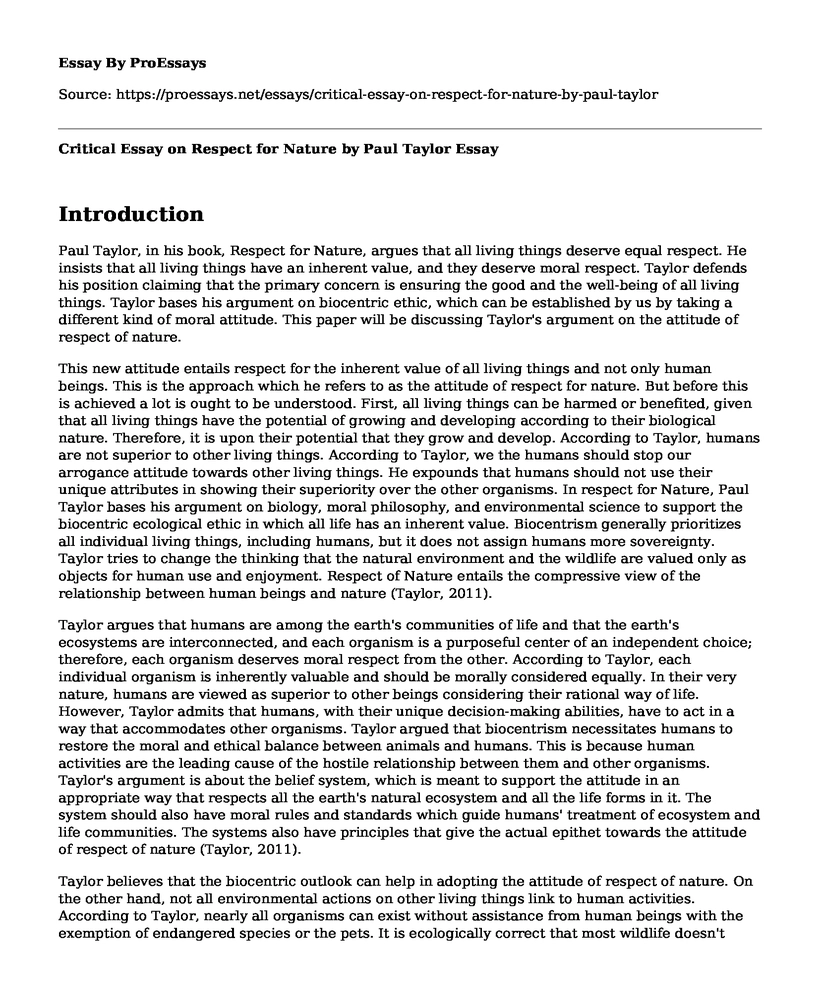Introduction
Paul Taylor, in his book, Respect for Nature, argues that all living things deserve equal respect. He insists that all living things have an inherent value, and they deserve moral respect. Taylor defends his position claiming that the primary concern is ensuring the good and the well-being of all living things. Taylor bases his argument on biocentric ethic, which can be established by us by taking a different kind of moral attitude. This paper will be discussing Taylor's argument on the attitude of respect of nature.
This new attitude entails respect for the inherent value of all living things and not only human beings. This is the approach which he refers to as the attitude of respect for nature. But before this is achieved a lot is ought to be understood. First, all living things can be harmed or benefited, given that all living things have the potential of growing and developing according to their biological nature. Therefore, it is upon their potential that they grow and develop. According to Taylor, humans are not superior to other living things. According to Taylor, we the humans should stop our arrogance attitude towards other living things. He expounds that humans should not use their unique attributes in showing their superiority over the other organisms. In respect for Nature, Paul Taylor bases his argument on biology, moral philosophy, and environmental science to support the biocentric ecological ethic in which all life has an inherent value. Biocentrism generally prioritizes all individual living things, including humans, but it does not assign humans more sovereignty. Taylor tries to change the thinking that the natural environment and the wildlife are valued only as objects for human use and enjoyment. Respect of Nature entails the compressive view of the relationship between human beings and nature (Taylor, 2011).
Taylor argues that humans are among the earth's communities of life and that the earth's ecosystems are interconnected, and each organism is a purposeful center of an independent choice; therefore, each organism deserves moral respect from the other. According to Taylor, each individual organism is inherently valuable and should be morally considered equally. In their very nature, humans are viewed as superior to other beings considering their rational way of life. However, Taylor admits that humans, with their unique decision-making abilities, have to act in a way that accommodates other organisms. Taylor argued that biocentrism necessitates humans to restore the moral and ethical balance between animals and humans. This is because human activities are the leading cause of the hostile relationship between them and other organisms. Taylor's argument is about the belief system, which is meant to support the attitude in an appropriate way that respects all the earth's natural ecosystem and all the life forms in it. The system should also have moral rules and standards which guide humans' treatment of ecosystem and life communities. The systems also have principles that give the actual epithet towards the attitude of respect of nature (Taylor, 2011).
Taylor believes that the biocentric outlook can help in adopting the attitude of respect of nature. On the other hand, not all environmental actions on other living things link to human activities. According to Taylor, nearly all organisms can exist without assistance from human beings with the exemption of endangered species or the pets. It is ecologically correct that most wildlife doesn't need the presence of humans to survive. The first step to achieve the attitude of respect of nature is accepting and understanding the equality and independence of all living creatures (Taylor, 2011).On the other hand, environmental ethics are based on two systems, the life-centered system and the human-centered system. The human-centered system gives humans superiority over other creatures. In this system, human beings have no obligation to act towards the good of protecting other living creatures. On the contrary, life -centered environment ethics entails that humans have the responsibility to take care of other organisms. This system bounds us to the moral obligation of protecting and promoting other living communities because they deserve our protection. According to this approach, humans should take care of the natural environment and avoid pollution in order to give other living creatures a clean environment in which they can maintain a healthy existence. Humans should use their rational thinking and decision making to help in protecting nature. Nature helps humans in many ways. For instance, trees give humans oxygen, which is essential in life. Therefore, Taylor's argument is necessary for understanding the significance of valuing nature and protecting all other living organisms.
Conclusion
In summary, Taylor's book on respecting nature is vital in environmental studies. Humans should be treated as members of the earth community of life, and they should treat other living organisms with respect. We should adopt the attitude of respect of nature, as discussed by Taylor. The future of life on earth depends on the human attitude towards nature. Taylor's book, respect for nature, remains relevant to biologists, environmentalists, and also philosophers, as well as anyone who cares about the future of life on earth. The book can also be used by scholars in environmental classes.
Works Cited
Taylor, Paul W. Respect for nature: A theory of environmental ethics. Princeton University Press, 2011.
"Paul W. Taylor | American Philosopher". Encyclopedia Britannica, 2019,
Cite this page
Critical Essay on Respect for Nature by Paul Taylor. (2023, Mar 12). Retrieved from https://proessays.net/essays/critical-essay-on-respect-for-nature-by-paul-taylor
If you are the original author of this essay and no longer wish to have it published on the ProEssays website, please click below to request its removal:
- "The Ocean at the End of the Lane" by Neil Gaiman Essay
- The Quiet Torrential Sound Essay Example
- A Macao Narrative Book Review Paper Example
- Essay Sample on Hamlet's Revenge: War, Murder, and Family in Denmark
- Essay Example on John Bunyan's Autobiography: Purifying the Church & Pilgrim's Process
- Changes in Macbeth's Character Essay
- Excerpts From Paradise Lost Analysis Paper Example







